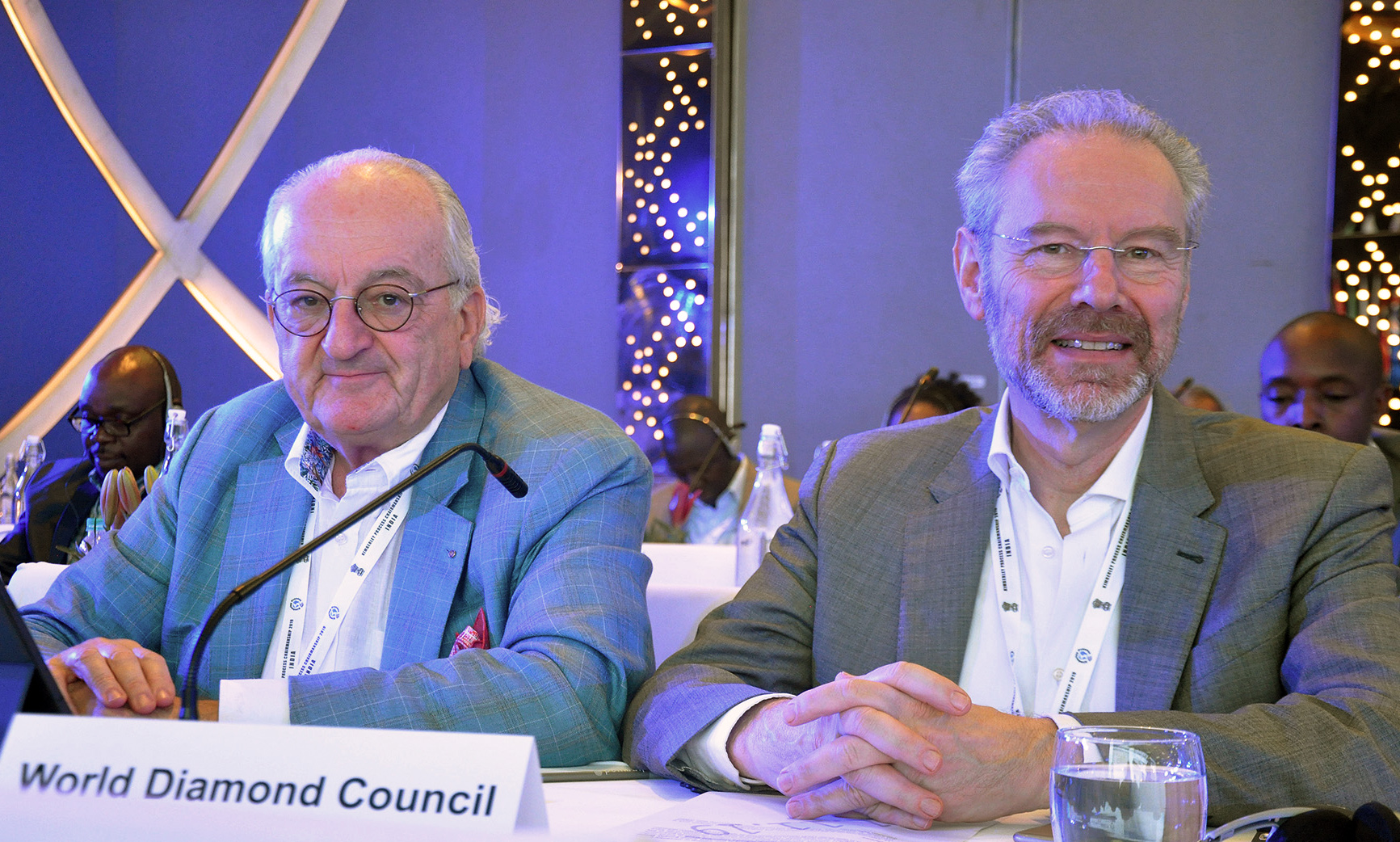A PASSING OF THE BATON AT THE WDC
AS TWO JUNE MEETINGS IN MOSCOW GO VIRTUAL

Incoming WDC President Edward Asscher (left) and outgoing WDC President Stephane Fischler, during the 2019 KP Plenary Meeting in New Delhi, India, in November 2019.
[ARTICLE UPDATED ON MAY 26, 2020] June had been scheduled to be a hectic travel period for both the World Diamond Council and the Kimberley Process. With the KP Intersessional Meeting set to take place in Moscow during the second working week of the month, the WDC’s Board of Directors had been preparing to gather in the Russian capital several days before, on June 5, to officially mark the passing of the baton from the outgoing president, Stephane Fischler, to the incoming president, Edward Asscher.
Then the COVID-19 global pandemic struck, and like most other public events planned after February 2020, the status of both the WDC Board Meeting and the KP Intersessional were thrown into doubt. With countries going into lockdown and international flights canceled, it soon became clear that the possibility of conducting face to face meetings, with delegates traveling in from around the world, would not be feasible.
Notably, neither event was cancelled. Within in days, both organizations began considering the alternative of conducting virtual meetings, with participants hooking up via video conference from the comfort of their homes.
Thus, despite the lockdown, the WDC prepared for the June 5 meeting, which in addition to the change in presidents, would feature a gathering of a new Board of Directors.
WDC Board Members serve for a maximum of three consecutive two-year terms, with the statutes requiring at least five to be elected every two years by a vote of all members of the organization. This year eight members were voted in at the beginning of March: James Pounds, Dominion Diamond Mines ULC; Anoop Mehta, Bharat Diamond Exchange (BDB); Karla Basselier, Antwerp World Diamond Council (AWDC); David Bouffard, Signet Jewelers Limited; David Bonaparte, U.S. Jewelry Council; Roberto Coin, Roberto Coin SpA; Kent Wong, Chow Tai Fook; and Eytan Amit, Malca-Amit. Ms. Bassalier and Mr. Amit are both first-term directors.
The ascension of the vice president to the post of president is automatic after two years, according to the WDC statutes. Mr. Asscher was elected WDC Vice President in 2018, and is a former president of the organization, having served in the position from 2014 to 2016.
The first order of business for the new Board of Directors on June 5 will be to elect a new set of officers, which includes the Vice President, Secretary and Treasurer. The new Vice President will become WDC President in 2022.
The logistics of the KP Intersessional, which over the years has served as a mid-year forum for all Participants and Observers in the Kimberley Process, ahead of the annual KP Plenary meeting which takes place toward the end of the year, are considerably more complicated than those of the WDC meeting. With many more delegates typically attending from countries around the world, a virtual event would need to take into consideration the time zones in which each operates and the sometimes limited Internet bandwidth that exists in some of those nations.
The government of Russia, which is the 2020 Chair of the Kimberley Process, had planned to organize what is it called a Virtual KP Meeting. According to the plan, it would run over four days, from June 8 to 11, instead of the five days that had originally been planned. In in addition to the opening and closing sessions, both of which will be video conferences, each of the KP’s working groups will also conduct virtual meetings during four-day online event.
However, on May 26, 2020, KP Chair Alexey Moiseev, Deputy Minister of Finance of the Russian Federation, notified all Participants and Observers that the virtual conference would be canceled. Instead, further work on drafting documents and discussing issues on the agenda will take place within the forums of the various working groups. The work of the KP, he said, will continue through teleconference calls, the Administrative Support Mechanism (ASM), email and other platforms.






